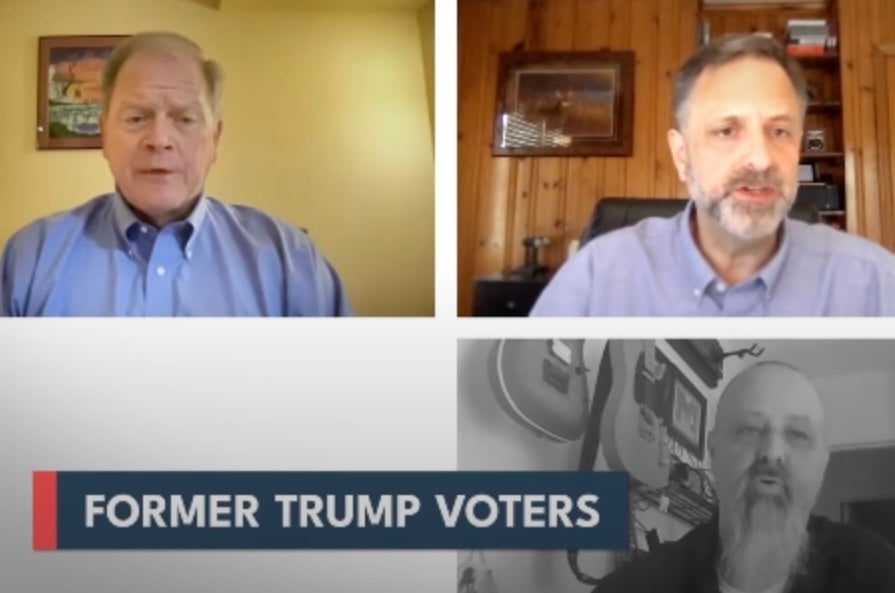Anti-Trump GOP group launches $11 million swing-state ad blitz featuring former Trump voters
The ‘Republican Voters Against Trump’ ad campaign features former Trump voters saying why they can’t support the ex-president again

Your support helps us to tell the story
From reproductive rights to climate change to Big Tech, The Independent is on the ground when the story is developing. Whether it's investigating the financials of Elon Musk's pro-Trump PAC or producing our latest documentary, 'The A Word', which shines a light on the American women fighting for reproductive rights, we know how important it is to parse out the facts from the messaging.
At such a critical moment in US history, we need reporters on the ground. Your donation allows us to keep sending journalists to speak to both sides of the story.
The Independent is trusted by Americans across the entire political spectrum. And unlike many other quality news outlets, we choose not to lock Americans out of our reporting and analysis with paywalls. We believe quality journalism should be available to everyone, paid for by those who can afford it.
Your support makes all the difference.A political action committee run by former Republican operatives is spending more than $11 million to blanket swing states with an ad campaign featuring former Trump voters explaining why they can’t support the ex-president in 2024.
The Republican Voters Against Trump campaign is spending $4.5 million in Pennsylvania, $3 million in Michigan, $2.2 million in Wisconsin, $1.5 million in Arizona and another $375,000 in Nebraska’s Second Congressional District (where a single electoral vote is up for grabs) to show a 30-second spot composed of testimonials from GOP voters who say they’re all voting for Democrat and Vice President Kamala Harris.
The advertisement, which will air on broadcast and cable television, opens with one woman saying: “I’m a two-time Trump voter.”
Another woman chimes in next, saying: “In 2024, I cannot support Donald Trump.”
Other ex-Trump voters appear on screen as they recite a litany of complaints against Trump, ranging from his support for the January 6 attack on the Capitol to his description of American veterans and war dead as “suckers” and “losers.”
“If Trump has a second term, it will be much worse than the first,” another voter says.
The ad concludes with all of them speaking as one, saying that they will be “proudly voting” for Harris.

The anti-Trump GOP group is also financing a series of billboards in the same swing states that feature the same voters as the video with text stating that they are voting for the vice president this year.
In a statement, Republican Voters Against Trump director of strategy John Conway called Trump “a threat to democracy” who “promises to do even more damage to our system if he is returned to power.”
“That’s why we’re reminding voters of how high the stakes are this election. And we’re doing it by spotlighting the voices of the most credible, trusted messengers available: real former Trump voters who refuse to support him again,” he said.
The project, which dates to the 2020 election cycle, is the brainchild of ex-Republican stalwart Sarah Longwell, former head of the LGBT+ Republican group known as the Log Cabin Republicans.
Longwell, a longtime GOP consultant who is known for her branding expertise and focus group work, is at the center of a sprawling universe of “Never Trump” conservatives. In addition to her work with RVAT, she’s involved with Defending Democracy Together — an anti-Trump and pro-democracy umbrella group run by former Weekly Standard founder Bill Kristol — and she is the publisher of the “Never Trump” movement’s unofficial bible, The Bulwark.
Unlike other anti-Trump Republican groups, Republican Voters Against Trump has used personal testimonials of the kind featured in this new 30-second ad to give former Trump supporters a way out by making it acceptable for them to even consider pulling the lever for a Democrat.
In April, the group launched a $50 million ad campaign with similar testimonial videos targeting so-called “blue wall” states — Wisconsin, Michigan and Pennsylvania.
Join our commenting forum
Join thought-provoking conversations, follow other Independent readers and see their replies
Comments